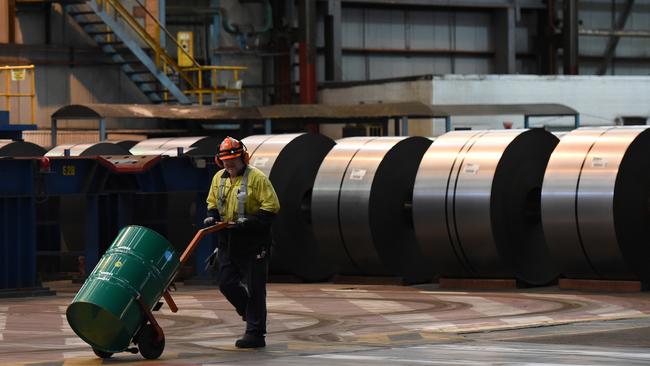
This is the first time someone has been charged with allegedly attempting to obstruct an investigation by the ACCC, although cases have been brought by the competition watchdog for lying.
The “official” in question is presumably part of the ACCC team that was investigating alleged price-fixing at BlueScope.
Meanwhile the Commonwealth Director of Public Prosecutions said it had considered the alleged cartel offences and had determined not to pursue criminal proceedings against either BlueScope or Mr Ellis.
Separate civil cartel proceedings filed by the ACCC against BlueScope and Mr Ellis remain before the Federal Court.
The burden of proof in a criminal case is higher than in a civil case.
The ACCC has had criminal cartel powers since 2009 but they are rarely used.
The watchdog is awaiting judgment in the so-called “Zimmer frame” case against Country Care Group for alleged price fixing behaviour.
The BlueScope case is the most high-profile cartel case launched by the ACCC since the action against Visy and the late Dick Pratt over a decade ago.
Announcing that civil cartel proceedings would continue, the ACCC said: “The ACCC alleges that between September 2013 and June 2014, BlueScope and Mr Ellis attempted to induce various steel distributors in Australia and overseas manufacturers to enter agreements containing a price fixing provision.”
The allegations of cartel conduct centred on threats of anti-dumping action against imported steel from a range of countries unless the exporters followed suggested prices.
The BlueScope case is the first time the ACCC has alleged use of dumping actions to threaten steel importers.
One of those allegedly threatened was Selection Steel and, ironically, when Mr Ellis left BlueScope in 2017 he started work as a consultant to Selection Steel.
Selection Steel’s boss Rod Gregory is known well to Mr Ellis’s former boss Mark Vassella, who now runs BlueScope.
Just how the events at BlueScope allegedly occurred has confounded others in the industry.
It should be noted that BlueScope denies any wrongdoing by it and by past or present executives.
In its statement to the ASX on Tuesday the company noted the nature of the CDPP charge against Mr Ellis was for alleged obstruction, not alleged cartel conduct.
The alleged offences carry vastly different penalties.
Mr Ellis, the son of former BHP chair Jerry Ellis, declined to return phone calls and his Selection Steel boss Rod Gregory was not immediately available.
The ACCC has won criminal cases against global shipping companies which have already been convicted offshore, but is yet to file an action successfully in Australia.
The BlueScope case comes as Liberty Steel has sought the extension of dumping duties against imported structural steel from Korea, Taiwan, Thailand and Japan.,
The duties have been in place for five years and Liberty, the monopoly structural steel supplier, wants them extended for another five years.
The request would seem to raise real doubts about the financial position of the company ahead of a mooted float.
Dumping duties are imposed when a product lands in Australia below the normal value in the country of origin and causes injury to the local producer.
It’s the second leg which would test the credibility of Liberty owner Sanjeev Gupta ahead of any float .





The Australian Competition and Consumer Commission’s difficulty in proving a criminal cartel case has been underlined by criminal charges against former BlueScope executive Jason Ellis for “inciting the obstruction of a Commonwealth official in the performance of their functions”.